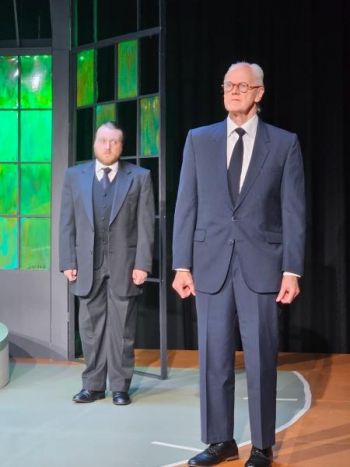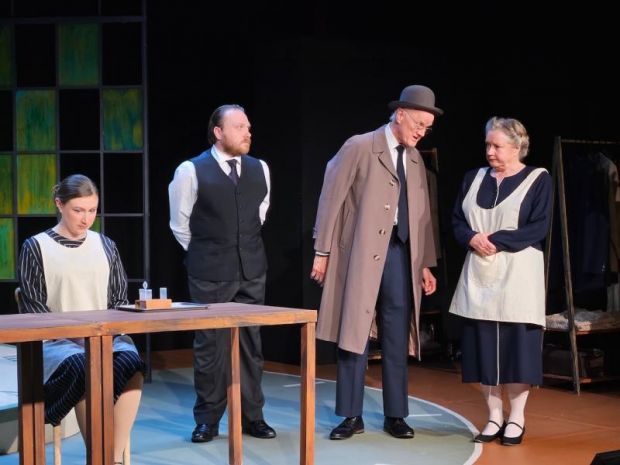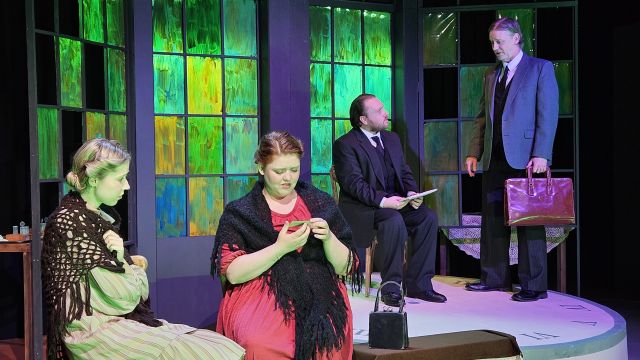Radium Girls
Radium Girls, presented by Galleon Theatre Group, narrates the horrific events which unfolded at the U.S. Radium Factory in Orange, New Jersey in the 1920’s. These factories were established across the United States to produce watches and military dials painted with a radium-based paint to glow in the dark.
Young women, hired because of their dexterity and small hands, worked, not knowing that by licking the brushes repeatedly between their lips, they were condemning themselves to slow deterioration and death, by radium poisoning.
The first death occurred in 1922, followed by many others as the women's health rapidly declined. We discover throughout the course of the play, the causes of death were frequently covered up or mislabelled as the company fought to hide the evil lurking beneath. Girls were instructed to use this “lip pointing” practice by their employers, who ultimately were responsible for their agonising ends.
Playwright DW Gregory pulls no punches in this script. It is heavy subject matter and can be wordy in places but is well researched and cleverly addresses issues which are of relevance today. We are confronted with the not so ethical decisions of corporate executives, medical and scientific professionals and the role of big companies in looking after the health of their workers. The cases brought to court as a result of the girls speaking out in the ‘20s, were instrumental in establishing occupational laws, mandating safety protective gear for workers and more precautions for staff wellbeing.
Due to the nature of the writing, jumping from scene to scene, with multiple blackouts, set changes and cast members playing many roles, this script presents a particular challenge for any director.

Kym Clayton, a talented director in Adelaide theatre, has used a Brechtian style approach in building the bridge between the actors and the audience. Brecht – style theatre is about connection, building a call to action for the audience to think about their own roles in societal change, and draw parallels with modern issues. This concern and reflection were certainly brought to the fore in this reviewer.
It was the mechanics of this play that brought some discomfort. Whilst staging a play which in true Brecht style is episodic, I felt that the silence between scene changes could have been filled by projection or ambient sound or music. Having the clothing racks onstage allowed for quick costume changes and the actors did their very best to make these and set changes as smooth as possible but I hope with time the pacing will improve.
The set itself was simple, a giant clock face on a rake dominating the stage and grimy factory windows providing a minimalist playing space. Simply by bringing on tables and chairs we found ourselves in different time periods and spaces. Lighting by Trish Winfield was skilful - the eerie green glows created to remind us constantly of the ever-present poison.
The play focuses on two main characters - Grace Fryer, played by Lucy Johnson, and U.S. Radium president Arthur Roeder, played by Adam Schultz. Both actors did a solid job. Johnson is Grace, the radium worker who becomes ill and starts to question the cause of the sickness impacting herself and her co- workers. She is particularly good in Act Two as she confronts doctors and lawyers who constantly try to push back against her claims. She truly shows her mettle as she fights to be heard. I did feel some more evidence of her developing disease in her physicality was needed however, in Act One.
Schultz’s Roeder was interesting and we saw the contrast between him as the company manager and family man clearly, but I felt at times the character development needed a little more work. Having said that it is acknowledged that in such short-burst scenes this is a challenge.
Aled Proeve played his four roles with skill - good contrast between each. I particularly enjoyed the contrast between ‘Tom’ the fiancé and the reporter scrambling to be the most sensational. Clever characterisation.
Deborah Walsh and Joanne St Clair brought their substantial stage experience to the play in many roles. Both switch accents with aplomb and their portrayal of each character (of many) were distinct and cleverly crafted. St Clair’s Marie Curie, and Mrs Roeder showed great skill in accent work and emotive acting. Walsh’s wonderful Sob sister, very reminiscent of Mary Sunshine, was a delight as was her officious factory supervisor with a great Scottish accent!
Andrew Horwood, likewise, showed his broad experience through multiple characters - a particularly well developed and executed one being that of smoothly cynical lawyer Edward Markley. Wonderful work.
Scott Battersby, like all cast members played many characters with great skill, but was particularly excellent as C.B. Lee, Roeder’s right-hand man. His genial love smitten cowboy was a highlight moment.

Deborah Proeve also was sound in all her characters. She displayed great ability in distinguishing between the two characters of Irene and Miss Wiley, in body language and manner (although not perfectly heard at times as Miss Wiley).
Veronica Wlodarczyk as Katherine was able to portray the youthful optimism and fun when working in the factory and contrasted this well against her other characters, particularly the Society woman.
Whilst the show can be heavy at times, there are some lighter moments that bring the humanity into what is a very depressing storyline. This play resonates today, as we have seen the lack of care for workers and people in general, repeated in the fossil fuel industries, forever chemical companies and tobacco industry as attempts to cover up and obfuscate the truth have historically occurred.
We leave Radium Girls enraged that this horror occurred, but empowered to speak out to ensure companies know we are watching.
Shelley Hampton
Subscribe to our E-Newsletter, buy our latest print edition or find a Performing Arts book at Book Nook.

